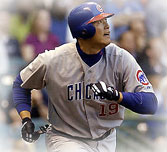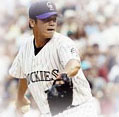<
|
|
|
|
And now, at a tense moment of a white-knuckle game, the big lefty was being called in to pinch-hit in hopes of sparking the rally needed to keep the Dodgers in the game.
On the mound for the Rockies was Chin-hui Tsao, MLB's first Taiwan-born player. In his brief major league career, the 23-year-old right-handed relief pitcher had shown a lively fastball clocked in the mid-90s, augmented by a good slider and a workable changeup. A swollen right shoulder had kept Tsao — a lean 6-2, 177 lbs — out for the first 2 1/2 months of the 2004 season, and he had been playing Triple-A ball while getting back in form. He had been called back up just two weeks earlier. Just a day earlier Tsao had thrown a nice mix of fastballs and changeups to keep the Dodgers hitless during a late inning of relief.

Slugger Hee Seop Choi began his major league career with the Cubs. He hit 15 home runs for the Marlins before being traded to L.A. in late July.
|
And now a stadium filled with 40,000 fans was holding its breath as the two young Asian athletes squared off across sixty feet of geometrically mown grass. What made the moment special to me was the fact that these young men weren't actors playing out some goofy script. There was nothing fake or rigged about the scene. They were real athletes who, by their talents and hard work, had put themselves into the position of representing professional teams carrying the hopes of millions of real fans. Nothing about the physiques, mannerisms or performances of Choi or Tsao was stereotypical. It was just two young athletes trying their hardest to help their teams, and both just happened to be Asian.
It was a Kodak moment for Asian American baseball fans, no matter whether they were rooting for the Dodgers or the Rockies.
Tsao tried to fake out Choi with a sinking changeup. Choi's bat reached down and slung it a dozen yards shy of the center-field fence. That double was driven home later in the inning, tying the game 2-2 and sending it to an 11th inning. Understandably, the wrapup shows and newspaper stories credited the 4-2 Dodger win to the 2-run homer by David Ross. Choi's double wasn't even mentioned. Fortunately, baseball is a frame-by-frame game and the audience carried away images of a clutch performance by a Corean athlete who, at 6-5, 240-lbs., made most of the other players in the game look puny.
That's the beauty of baseball. Unlike everything else in the media, the performances aren't scripted; the outcomes aren't foreordained. It's the only arena in which millions of Americans routinely see Asians in action, their every key move amplified in slo-mo replay — good, bad or catastrophic.
That brings us to the moment that converted me from a baseball-derider to a fan: Byung-Hyun Kim closing for the Diamondbacks in the 2001 World Series against the Yankees. He gave up two ninth-inning homers in Yankee Stadium. It was as awful a moment as any pitcher could imagine. For me it was an eye-opener that left some indelible impressions.
First, I wasn't bothered by seeing an Asian fail in the spotlight. Sure, I would have preferred to see Kim strike the other side out in order. Instead I got to see an Asian pitcher who felt the weight of the World Series come crashing down on him. Kim's dismayed drop into a kimchi squat was a memorable human moment for an Asian — the rarest of sights in the American media. If it took having an Asian pitcher blow a save in the World Series for America to see us as human beings, so be it.
PAGE 2
1 |
2
|
|
|
|
|
“It's the only arena in which millions of Americans routinely see Asians in action, their every key move amplified in slo-mo replay — good, bad or catastrophic.”
|
CONTACT US
|
ADVERTISING INFO
© 1996-2013 Asian Media Group Inc
No part of the contents of this site may be reproduced without prior written permission.
|

 nd of September. Bottom of the tenth. Dodgers trail Colorado 2-1. A Dodger win would tighten the ratchet against division rival SF Giants. Sent up to lead off the inning is Hee Seop Choi.
nd of September. Bottom of the tenth. Dodgers trail Colorado 2-1. A Dodger win would tighten the ratchet against division rival SF Giants. Sent up to lead off the inning is Hee Seop Choi.

